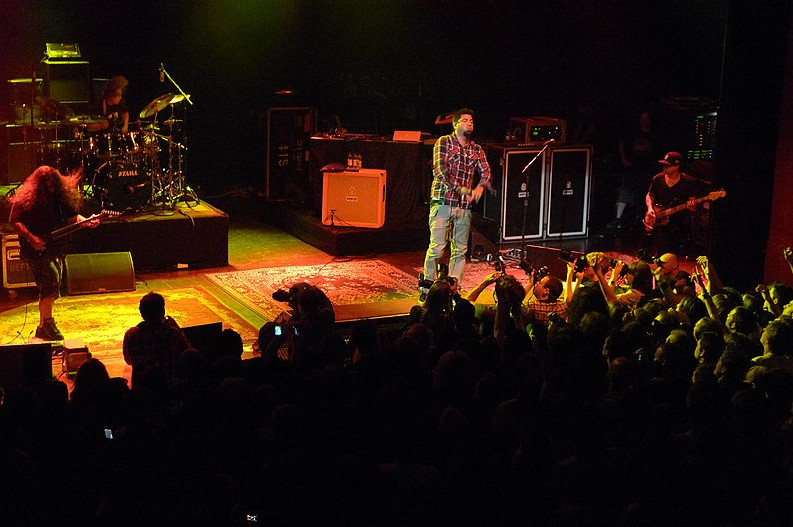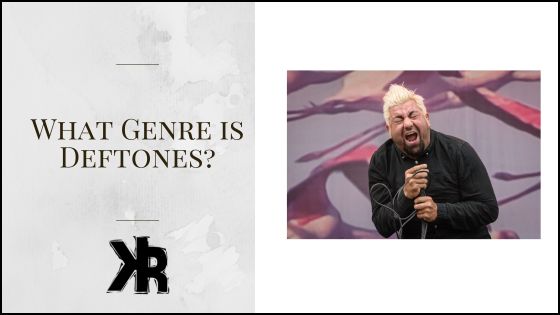Table of Contents
Deftones have carved out their own section of the vast music industry. They have consistently pushed boundaries and evolved their sound throughout their career, solidifying their status as one of the most influential bands in the alternative metal scene. But what genre is Deftones really?
Deftones can be classified as an alternative metal band. Their music combines elements of heavy metal, shoegaze, and post-hardcore, creating a blend that sets them apart from others in the genre.
In this Killer Rig article, we will explore their powerful and aggressive instrumentals, haunting vocals, and experimental song structures to narrow it down.
Key Takeaways
- Alternative, post-metal, and alternative rock are all combined into one band called Deftones. Their music contains powerful guitar riffs, ethereal textures, and sentimental lyrics.
- While Deftones can be categorized as metal, their music transcends traditional genre boundaries. Their inclusion of elements from other genres adds complexity to their sound.
- Although Deftones have historically been linked to nu metal, their sound has developed throughout time and now draws from a wider spectrum of influences. They are always experimenting with their sound and pushing the limits.
What Genre Is Deftones?
Deftones’ genre is a captivating blend of various musical styles like Nu Metal, alternative, and even post punk. Their sound is created around defying traditional categorization. So we need to look at other elements to help define them:
1. Dynamic and Melodic: Deftones effortlessly mixes heavy and aggressive metal riffs with mesmerizing melodies, creating a captivating sound that transcends conventional genre boundaries.
2. Experimental and Alternative: Deftones fearlessly explore unconventional techniques and incorporates alternative elements into their music. They push boundaries, constantly evolving their sound and refusing to conform to any specific genre.
3. Emotional and Atmospheric: Their music is known for evoking a range of emotions, from intense aggression to haunting beauty. Their atmospheric and introspective lyrics combined with atmospheric instrumentals create an immersive sonic experience.

Is Deftones Metal?
When you listen to Deftones, it’s clear they have strong metal influences. Their pronounced guitar riffs, dominant drum patterns, and powerful vocals align with many characteristics of the metal genre. However, labeling them solely as a metal band doesn’t capture the full picture.
Deftones incorporate elements from other genres, such as the ethereal tones of shoegaze and the intensity of post-hardcore. Their music often shifts between hard-hitting metal sections and softer, melodic interludes, offering a dynamic listening experience.
Deftones are rooted in metal, it’s true. But, they’ve expanded their musical horizons, making them more than just a traditional metal band. They have established themselves as a key force in the music business by defying and reinventing genre boundaries thanks to their differing approach.
Is Deftones Nu Metal?
Deftones have often been linked with the Nu Metal genre, especially during its rise in the late 1990s. Their heavy guitar riffs and mix of melodic singing with aggressive vocals align with the hallmarks of Nu Metal.
Nu Metal combines alternative, rap metal, and grunge. It’s recognized by its heavy guitar riffs, offbeat rhythms, and a combination of singing and rap-like vocals. Bands such as Korn, Linkin Park, and Slipknot were at the forefront of this genre, merging aggression with catchy melodies.
However, Deftones also draw from other genres like post rock, dream pop, and even Djent. While they share some similarities with Nu Metal, they also explore different musical territories, making it challenging to label them strictly within one genre.
Their music resonates with the energy of Nu Metal but also ventures into more atmospheric and introspective areas.
What Does the Name “Deftones” Mean?
Another way to figure out the genre of the band would be to look into what their name means. Perhaps we can get a glimpse into their direction but exploring the name.
And as it turn out, the name “Deftones” was chosen by the band members as a way to describe their music. However, there are different interpretations of the name by fans and critics.
Some have suggested that the name is a contraction of “deft” and “tones,”. Meanwhile, others have speculated that it is a reference to the Delfonics, a soul band from the 1960s.
Chino Moreno, the band’s lead vocalist, stated in an interview with The Quietus that the name “Deftones” was inspired by the originally African American slang “def,” which came to be closely associated with hip hop in the 1980s, meaning outstanding, and combines this with ‘tones’.
Stephen Carpenter, the band’s guitarist, has also stated that he wanted to pick something that would just stand out, but not be all cheese-ball at the same time.
The exact meaning behind the name “Deftones” remains open to interpretation, but we can use it to help us pinpoint the genre of the band.
FAQs
What are some defining characteristics of Deftones’ music?
Deftones’ music is characterized by dynamic contrasts, combining ethereal and haunting melodies with aggressive, powerful guitar riffs and intense drumming. Their sound often explores dark and introspective themes, touching on emotions like love, pain, and inner turmoil.
Which albums by Deftones have become iconic within the alternative metal genre?
Deftones’ albums like “White Pony,” “Around the Fur,” and “Diamond Eyes” have become iconic within the alternative metal genre, pushing the boundaries of what heavy music can be.
How has Deftones’ music evolved over time?
Deftones’ music has evolved, showcasing their willingness to experiment with new sonic textures and approaches while staying true to their emotional core.
Subsequent albums like “Deftones” and “Saturday Night Wrist” continued to explore sonic diversity, incorporating elements of shoegaze and post-metal. “Diamond Eyes” was a powerful return after a hiatus, with a more focused and intense sound.
“Koi No Yokan” and “Gore” showcased the band’s ability to maintain their core identity while experimenting with new textures and arrangements.

